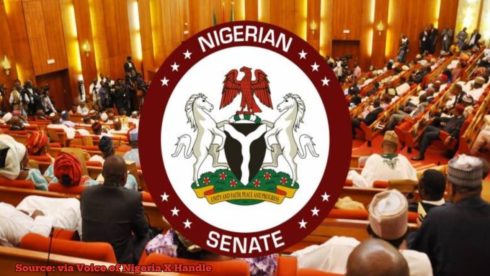The Nigerian Senate on Thursday passed for second reading a groundbreaking bill seeking to harmonize the conduct of all national and sub-national elections on the same day. The proposed legislation, which covers presidential, governorship, National Assembly, and State House of Assembly polls, marks a significant departure from the current staggered electoral system. It is aimed at enhancing electoral efficiency, reducing costs, and promoting voter turnout across the country.
The bill, sponsored by Senator Ali Ndume (APC, Borno South), received resounding support across party lines during plenary. Senate President Godswill Akpabio described the initiative as a “bold and timely intervention” in Nigeria’s democratic evolution. The bill has now been referred to the Senate Committee on Electoral Matters for in-depth consideration and stakeholder engagement before it returns for a third reading.
Nigerian Senate Targets Electoral Reform and Cost Efficiency
The Nigerian Senate is making a strategic move to overhaul the nation’s electoral calendar by unifying election dates, a change that could yield far-reaching benefits. Senators who debated the bill cited the enormous financial burden associated with staggered elections, noting that a one-day electoral event would significantly reduce public expenditure. Current practices often require repetitive mobilization of electoral staff and security agencies, straining national resources.
In addition to cost savings, lawmakers emphasized the need to enhance electoral credibility and reduce voter fatigue. According to the Senate, synchronized elections would encourage higher voter turnout and eliminate the psychological disenchantment that accompanies prolonged election cycles. The harmonization is also projected to minimize manipulation and political interference that frequently mar sequential polls.
Nigerian Senate Weighs Economic and Security Merits of Reform
The Nigerian Senate underscored the economic rationale behind the proposed unified election model, stressing its potential to cut billions of naira from the national budget. Senators argued that conducting all elections in one day would streamline logistics, reduce duplicative spending, and make election planning more predictable and accountable. They believe this will improve transparency in the allocation and disbursement of INEC’s operational funds.
Security was also a focal point in the Senate’s deliberation, with lawmakers highlighting how multiple election days stretch security agencies thin and increase the risk of violence. A unified election day, they argued, would enable better deployment of security personnel and more robust coordination. The Senate noted that a compressed election timeline would help stabilize post-election environments, allowing governments to quickly transition into office and focus on governance.
Nigerian Senate Hears Stakeholder Opinions on Bill
The Nigerian Senate acknowledged the growing support from civil society organizations and electoral reform advocates who have long called for a unified election schedule. Groups like the Centre for Democratic Development and Electoral Integrity Nigeria (CDDEIN) welcomed the Senate’s action, stating it reflects responsiveness to public calls for electoral modernization. Civil society representatives are expected to be invited to committee hearings to provide further insights.
However, the Senate also noted opposing views, particularly from electoral experts and logistics practitioners who questioned the feasibility of implementing a nationwide same-day vote. Critics cautioned that inadequate infrastructure, especially in rural and underserved areas, could hinder smooth execution. The Senate Committee on Electoral Matters has been tasked with examining these concerns and proposing pragmatic implementation strategies.
Nigerian Senate Reviews Legal Pathway for Implementation
The Nigerian Senate acknowledged that the bill’s success hinges on a complex legal amendment process, including alterations to the 1999 Constitution and the Electoral Act. Lawmakers are already exploring the necessary legal frameworks required to actualize the synchronization, including adjustments to tenure timelines and transitional clauses. The Senate emphasized the importance of aligning the bill with constitutional mandates to avoid legal ambiguities.
Furthermore, senators stressed the need for robust collaboration with the Independent National Electoral Commission (INEC), the National Judicial Council, and legal experts to ensure that any legislative changes are enforceable and constitutionally sound. The Senate aims to avoid scenarios where the law is passed but lacks the legal backing for implementation due to oversight or lack of harmonization with existing statutes.
Nigerian Senate Charts Roadmap for Final Passage
The Nigerian Senate has now set the stage for the bill’s progression by mandating the Electoral Committee to conduct nationwide consultations and technical reviews. The committee is expected to return with a comprehensive report detailing potential roadblocks, constitutional implications, and operational timelines. This step is crucial before the bill proceeds to the third reading and final passage in the Senate.
If passed, the bill will move to the House of Representatives for concurrence, and subsequently to the President for assent. The Senate expressed optimism that with adequate political will and institutional backing, the bill could be enacted in time to guide the framework of the 2027 general elections. Lawmakers reiterated their commitment to delivering a more efficient and credible electoral system that aligns with global best practices.
Table of Contents
Discover more from OGM News NG
Subscribe to get the latest posts sent to your email.














